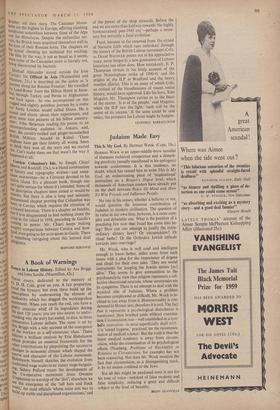Judaism Made Easy
This Is My God. By Herman Wouk. (Cape, 18s.)
HERMAN WOUK is an upper-middle-brow novelist of immense technical competence and a disturb- ing proclivity (usually manifested in his epilogues) towards conformism. It is this tendency, no doubt, which has caused him to write This Is My God, an embarrassing piece of 'inspirational' journalism on a Reader's Digest level, which thousands of American readers have already put on the shelf between Peace Of Mind and How To Win Friends and Influence People.
No one in his senses, whether a believer or not, would question the immense contribution of Judaism to modern civilisation. The question of its value in our own time, however, is a more com- plex and debatable one. What is the kosition of a practising Jew now that Israel has come into be- ing? How can one attempt to justify the extra- ordinary dietary laws? Or circumcision? Or ritual baths? Or the Orthodox Jewish attitude towards inter-marriage?
Mr. Wouk, who is well read and intelligent enough to know better, sidles away from such issues with a plea for the importance of dogma and ritual for their own sake. 'They are social instruments for keeping the Jewish nation [sic] alive.' This seems to give ammunition to the psychoanalytic view that religion represents a col- lective obsessional neurosis, whose ceremonies are its symptoms. There is no attempt to deal with the mystical side of Judaism. Where a problem becomes complicated or difficult, Mr. Wouk is in- clined to run away from it. Homosexuality is con- demned in Mosaic law, therefore it is evil. The fact that it represents a psychological disturbance is mentioned, then brushed aside without examina- tion. Circumcision, too—well established as a sym- bolic castration—is most superficially dealt with : it is 'sound hygiene,' practised 'on the recommen- dation of medical science.' But the truth is that the latest medical tendency is away from circum- cision, while the examination of its psychological effects (Nunberg, Problems of Bisexuality in Relation to Circumcision, for example) has not been reassuring. Nor does Mr. Wouk mention the fact that circumcision, as a distinguishing mark, is by no means confined to the Jews.
Yet all this might be pardoned were it not for his tone of voice—redolent of false modesty and false simplicity, reducing a great and difficult subject to the level of banality.
BRIAN GLANVILLE










































 Previous page
Previous page